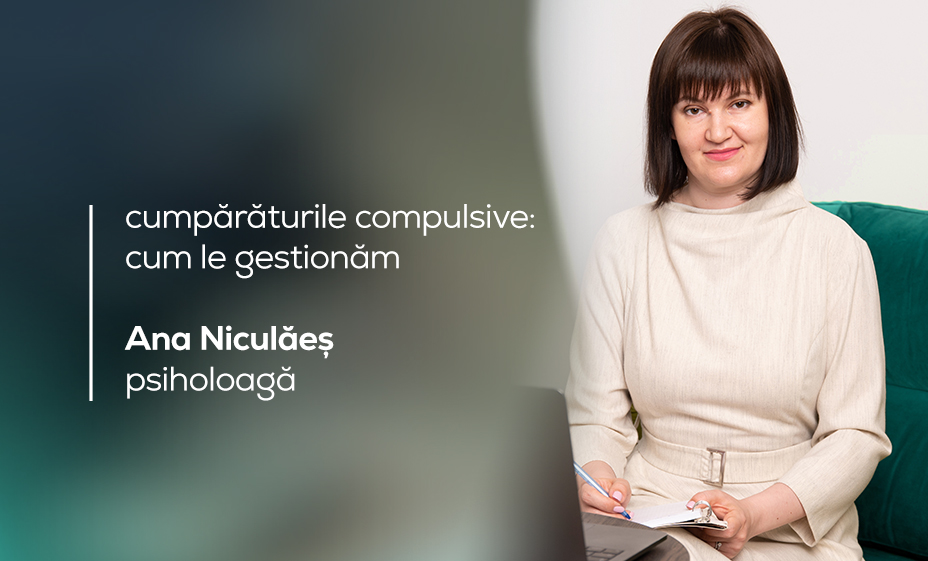In a previous article on the maib edu platform, we discussed with Ana Niculăeș, Respiro psychologist, how we should approach the topic of money with teenagers. In this article, we discuss another aspect of our psychological relationship with money-compulsive shopping.
Compulsive shopping is a behaviour characterised by the repeated and excessive purchase of products or services, often impulsively and without considering the financial or emotional consequences. This behaviour can become problematic and affect a person's life quality, relationships and financial status.
Compulsive shopping can be triggered and driven by several factors, and the reasons can differ from person to person. Typical triggers for the behaviour include the following:
- Stress and anxiety. Many people use shopping to cope with stress, anxiety or other negative emotions because it can provide a brief psychological relief or a temporary feeling of satisfaction.
- Advertising and social pressure. Publicity, media and social pressure can play a significant role in increasing the desire to compulsive shopping. Advertising and social media influencers can promote a consumption-based lifestyle, creating pressure on people to buy more.
- Compulsion to get discounts and offers. Some people may be motivated by a compulsion to find discounts, special offers, or to take advantage of sales. This desire to save money can lead to impulse buying, even if those products are unnecessary.
- Underlying psychological problems. Compulsive shopping can be associated with psychological disorders such as obsessive-compulsive disorder (OCD), social anxiety disorder or severe depressive disorder.
Can compulsive shopping be influenced by financial education?
According to the specialist, financial education can be an effective tool for preventing and managing compulsive shopping. Learning money management skills and developing a healthy financial mindset can help us better control our shopping behaviour and make wiser financial choices.
In this regard, aspects of financial literacy that could diminish compulsive shopping urges are:
- Budget awareness. Financial education helps people create and stick to their budget. By setting limits on spending and sticking to them, a person can reduce the risk of compulsive spending that goes over budget.
- Identifying real needs. A sound financial education helps one distinguish between real needs and impulsive desires. Knowing the difference between what is essential and what is desired can help avoid unnecessary spending.
- Learning saving skills. Financial education can teach people how to save money for important goals and how to invest in the future. This can provide a healthy alternative to compulsive shopping, as the person can derive satisfaction from progress towards financial goals.
- Assessing the financial consequences. Proper financial education helps to understand the economic consequences of impulsive spending and debt. This can motivate a person to make more rational financial decisions and avoid excessive debt.
Developing the ability to manage compulsive shopping can take time, effort and self-control, but there are many effective methods that, combined with the financial education process, will help. Here are some strategies that might help:
- Create a budget. Set a monthly budget that includes all necessary expenses such as bills, rent, food and savings. Allocate a reasonable amount for groceries and stick strictly to your budget.
- Make a shopping list. Before shopping, make a detailed list of the things you need. Set a time limit for shopping and avoid buying items not on the list.
- Avoid shopping places. If you face frequent temptations, avoid or reduce visits to shopping malls or online stores. Limiting your exposure to shopping places can help you better control your impulses.
- Recognise triggers. Try to identify your triggers for compulsive shopping, such as stress, anxiety or boredom. One of the most effective ways to control compulsive behaviour is to understand the underlying causes and find healthy alternatives to coping with these emotions.
- Set a waiting period. Before making a significant purchase, give yourself time to reflect. Set a waiting period, for example, 24 hours or more, before purchasing, allowing you to assess whether you really need the product carefully.
- Seek professional help. If compulsive shopping significantly affects your life or is challenging to manage, seek help from a therapist or counsellor who specialises in obsessive-compulsive behaviour or problems with overspending.
Compulsive shopping can harm our mental health and quality of life for several reasons: it affects our relationships, causes financial stress, feelings of guilt and shame, addiction to material objects and self-control problems. However, it is important to note that a certain level of shopping or personal spoiling can have a positive effect on our well-being, providing a sense of satisfaction or pleasure. This should take place in a balanced and adequately managed way.
It is essential to have self-control and learn to spend our money in a way that does not jeopardise our financial or emotional well-being. If compulsive shopping becomes a problem, asking for professional psychological help can be essential to developing healthier management skills.
How often have you regretted compulsive shopping?





